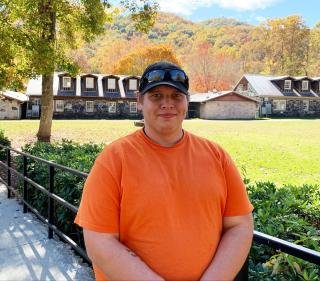Teamwork binds firefighting apprentices together
COLORADO—Forest Service Job Corps Civilian Conservation Centers receive excellent marks for placing their students in well-paying jobs. One reason behind this success is apprenticeships. The CCC training model has always incorporated the five key components of an apprenticeship, including a paid job where a student earns industry-recognized credentials and participation in both classroom and work-based learning under the instruction of a mentor.
Union-operated pre-apprenticeship programs were introduced at CCCs in 1966. In 2013, the Job Corps program forged a partnership with USDA Fire and Aviation to establish a pipeline of skilled wildland firefighters built on earning professional certifications and participating in work-based learning.
Lyndon B. Johnson Job Corps Wildland Firefighter Type 2 trainee Timothy Hawkins, who enrolled in Job Corps to train as a firefighter and welder, is a good example of how the Job Corps program is yielding results. Hawkins will earn his red card, certifying him as a firefighter type 2, by completing Federal Emergency Management Agency courses, a 40-hour in-person fire school and passing the physically arduous Pack Test, walking three miles in 45 minutes carrying a 45-pound pack. As a young firefighter-in-training, Hawkins said the most important skill he has learned is situational awareness—watching your surroundings and knowing and relying on your fellow firefighters.
“Whether you’re on the fire or not, you are part of a team and always show the team respect.” Hawkins feels that all Job Corps students should train and participate in wildland firefighting just so they can experience the camaraderie.
“I worked as a volunteer firefighter in Franklin, North Carolina, before I joined Job Corps,” said Hawkins. “In Job Corps, the travel is exciting and the opportunities in wildland firefighting are great.” Although he has not yet deployed as a firefighter type 2, he goes out on assignments as a member of a camp crew, providing logistical support on fires. To qualify for a camp crew, students must complete online FEMA training, in-person training, and participate in physical fitness activities.
Hawkins deployed to Ridge Creek Fire on the Idaho Panhandle National Forests on a camp crew in late summer 2023. “The atmosphere at Ridge Creek was incredible,” said Hawkins. “Everyone worked as a team and the work was accomplished. We were all in the same fight; no one was better than anyone else. Being a student at Job Corps gets me connections within the Forest Service and with getting a job in wildland firefighting and participating in camp crews definitely helps.”
Students enrolled in CCC wildland firefighting programs receive top-notch training, but what elevates their training are work-based learning opportunities on national forests and grasslands. These partnerships provide mutual benefits and strengthen the agency’s firefighting workforce. Host forests get much-needed assistance and students work with and observe seasoned wildland firefighters and are provided the opportunity to earn while they learn while networking and gaining professional references that will be helpful as they advance in their careers.
Hawkins’ future career plans include working seasonally as a wildland firefighter while also working as union welder. “My training at Job Corps will help me achieve these goals,” said Hawkins. The money he will earn as a wildland firefighter and camp crew member while enrolled at LBJ will help ease his transition to independent living after graduation.
Job Corps CCCs offer 12 Forestry Conservation and Wildland Firefighting trades. As the Job Corps program pursues its national curriculum and apprenticeship strategy, using Schenck Job Corps CCC’s Advanced Fire Management Training program as the model, it has established four additional programs at Columbia Basin, Collbran, Great Onyx and Trapper Creek Job Corps centers. Conservation Corps Centers have a successful track record of sending graduates of its fire and advanced fire management programs to the Wildland Firefighter Apprenticeship program. This program provides two academies built to fortify coursework in all fire disciplines including hand crew, engine crew, helicopter crew, prevention and fuels. The CCC Advanced Wildland Fire Management program helps graduates enter the apprenticeship program at the GS-04 level, accelerating their promotion potential in the Forest Service.
With their legislatively directed conservation mission, CCCs address youth employment and help conserve our nation’s natural resources. Apprenticeships are a perfect alignment with Job Corps’ mission to strengthen rural and urban economies by providing youth with the skills and work experience to obtain and keep a living wage job. If your forest or region is interested in hosting a wildland firefighting intern or crew, contact JCNO-FAM Program Coordinator CorDell Taylor at 970-615-0922 or cordell.taylor@usda.gov.

